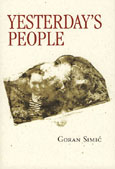 This is what happens when I don’t take notes. Two months ago, I sat down to read Yesterday’s People, a collection of eight short stories by Goran Simic. Born in Bosnia, Simic was already a noted author and poet when he immigrated to Canada ten years ago. I decided to write about these spare, haunting and haunted stories, many of them about life in Sarajevo in the mid 90s. But for reasons that now completely mystify me, I wasn’t making notes, which would have been fine had I begun writing this immediately. Two months and three or four novels later, I began to write and I hit a brick wall.
This is what happens when I don’t take notes. Two months ago, I sat down to read Yesterday’s People, a collection of eight short stories by Goran Simic. Born in Bosnia, Simic was already a noted author and poet when he immigrated to Canada ten years ago. I decided to write about these spare, haunting and haunted stories, many of them about life in Sarajevo in the mid 90s. But for reasons that now completely mystify me, I wasn’t making notes, which would have been fine had I begun writing this immediately. Two months and three or four novels later, I began to write and I hit a brick wall.
While I remembered the images and the tone of the stories, damned if I could remember any names, or specific details. And the images that I did remember were beginning to blend into each other. I was in a haze. I had been immersed in that world. And then I was out. I had shifted through time and space into other worlds. I was in Jonathan Lethem’s Brooklyn, then in Stephen Clarke’s contemporary Paris, and most memorably I was amongst Balzac’s characters in 1800s Loire Valley, as drunk on his words as I would be if I’d been one of his wine growers in the French countryside. The images of the Bosnian war had been overshadowed. I could never do them justice.
So I began to re-read. I cracked open Simic’s collection and dove back in, revisiting the characters, and the horrors of war, and the resourcefulness and resilience of spirit that had moved me the first time.
I revisited Nina. We were back in Sarajevo, during the war. A gothic wild west of thievery and morgues, where “we were all slowly going mad.” Nina and our narrator shared a past, and our narrator now spots her amongst the people lining up for water, “a shadow of what she used to be.”
In “Minefield,” volunteer soldiers protect a ravine. Their initial Rambo bravado is shattered when one of them blows himself up with a grenade. They grow up fast. They begin doing deals with the other side: “as time passed and our ammunition dwindled, we shot less and swore more.” It’s trench warfare except the two sides volley benign insults and supplies. And then grim reality throws them a curve.
In “The Story Of Sinan” we see the early days of the war when “we thought it all a brief private nightmare that the world had nothing to do with.” We meet Sinan whose daily routine has been inconvenienced by the war. To him, it’s an annoyance. He’s a gambler and carouser who lives by his wits. (He tells women, when he’s through with them, that his wife has been released unexpectedly from prison though she was supposed to have served five more years for murdering his ex-mistress). Then another curve, this time a sudden and unexpected act of kindness and selflessness.
And as I re-read Yesterday’s People I noticed something that I hadn’t really picked up on the first time. I noticed that the stories are not just about Bosnians – then. They’re also about Canadians – now. In every story, a character either escapes to Canada or someone linked to him does. Sometimes the stories are actually written from the point of view of someone here, now, flashing back to his life there, then. There are photos throughout the stories, snapshots of the narrator’s past. The stories are about memory, about trying to remember and trying to forget. They’re about one’s tenuous link to one’s history. They’re war stories that don’t end in the trenches or in the long line-ups for water. They don’t end when the shooting stops. They’re brought up to date through the memory of the narrator. They’re immigrant stories.



